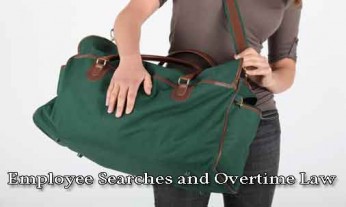 Employee searches and overtime law. Imagine you work in a store that has had problems with employees stealing valuable merchandise. The store now has a policy that when an employee leaves at the end of a workday, any bags that he or she brought into the store will be searched. As such, after you punch out at the conclusion of each shift, you wait while a security guard goes through your bags.
Employee searches and overtime law. Imagine you work in a store that has had problems with employees stealing valuable merchandise. The store now has a policy that when an employee leaves at the end of a workday, any bags that he or she brought into the store will be searched. As such, after you punch out at the conclusion of each shift, you wait while a security guard goes through your bags.
When you were hired, you signed a contract allowing the store to search your bags. But you think it is unfair that you are not being paid for the time you spend waiting while the searches take place. Do you have a valid labor complaint?
According to the U.S. District Court for the Northern District of California, the answer is no. In Frlekin v. Apple, the Court recently dismissed a class-action suit filed by Apple employees who sued Apple for compensation for occasions when Apple searched their bags and verified ownership of their electronic devices. The employees argued that the time during which the searches took place should be considered “hours worked” under the standards of Wage Order 4.
Required Activities vs. Optional Activities
The Court sided with Apple and granted summary judgment, holding that the searches did not constitute hours worked. The court applied the traditional test of the control theory of liability, which takes into account whether the employer restrained the actions of an employee, and whether the employee has no plausible way to avoid the activity. The ruling states that while the plaintiffs demonstrated that Apple restrained their actions during the searches, the second prong of the test was not satisfied because the employees could avoid the searches if they did not bring bags into the stores where they worked, and thus the searches were optional.
The Court cited other cases such as Overton v. Walt Disney Co., in which employers were not required to pay for time spent by employees off the clock. Overton involved a Disney employee who sought compensation for time on a shuttle bus that carried him from an off-site parking lot to Disneyland’s employee entrance. The complaint was rejected because the worker had other options for getting to the employee entrance, such as walking from the parking lot, which was a mile away. The ruling rejected the employee’s argument that the shuttle bus was the only practical method of transportation.
In Frlekin, the Court also pointed out that none of the plaintiffs argued that they brought bags to work based on special needs – even though the class notice invited members with special needs to assert such a claim. The Court held that the plaintiffs were all in a position to freely choose to not bring bags to work.
Overtime Law and Wage and Hour Claims
If you are facing any type of wage and hour claim, or you are considering filing one, the employment and labor law attorneys at Beck Law P.C. in Santa Rosa can help. They serve clients in Santa Rosa, Petaluma, Ukiah, and all of the North Bay Area counties.
